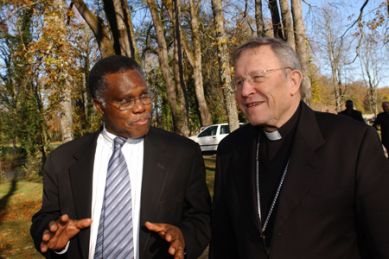Prominent Catholic Ecumenist Retires

Cardinal Walter Kasper, the head of the Pontifical Council for Promoting Christian Unity (PCPCU) for nearly a decade, officially retired on Thursday.
Kasper, 77, was part of the council since 1999, acting first as secretary and two years later as president. As president of the council, Kasper was also president for the Commission for Religious Relations with the Jews.
Previously, Kasper had served as co-chairman of the Lutheran-Catholic Commission of Unity and on the World Council of Churches' Faith and Order Commission.
Under Kasper's leadership, the PCPCU conducted dialogue with numerous Christian denominations and groups including the Anglican Communion, the Baptist World Alliance, the Eastern Orthodox Church, the Lutheran World Federation, the Pentecostal Church, the Presbyterian Church (U.S.A.), the World Methodist Council, and the World Alliance of Reformed Churches.
The cardinal was also particularly active in promoting relations between Catholics and Jews.
In 2000, Kasper voiced public criticism of a document adopted by the Vatican called Dominus Iesus, which he said caused misunderstanding with Jewish people.
Three years later, Kasper wrote a paper called Anti-semitism: A wound to be healed for the European Day of Jewish Culture. A year later was awarded by the International Raoul Wallenberg Foundation for his work in reconciling Jews and Catholics.
B'nai B'rith International, a global Jewish advocacy group, paid tribute to Kasper upon hearing of his retirement, saying that he demonstrated an "approach of constructiveness and healing" in his engagement with Jewish leaders.
"[Kasper's] leadership of the Commission for nearly a decade has been characterized by great devotion – indicative of the profound importance of, and immense strides over the course of less than half a century in, the Catholic-Jewish relationship," the group's leaders wrote, adding that the cardinal's personal role in "caring for and advancing this endeavor has been significant."
Kasper was also honored by Anglican Communion leader Dr. Rowan Williams, the Archbishop of Canterbury, who said that working with Kasper on ecumenical issues has been an "inestimable pleasure and privilege."
"Anglicans have always been made welcome by Cardinal Kasper in Rome. We have felt ourselves to be received as brothers and sisters in a common faith and mission, notwithstanding the many challenges that arise for ecumenical dialogues in our day," Williams wrote.
"He will be greatly missed by his many friends in the Anglican Communion, not least myself."
In a June 25 press conference announcing his retirement, Kasper underscored the importance of ecumenism, calling it "not an extra, but a constituent" of the church.
"Ecumenism is not done from one's desk. Dialogue is life. Dialogue is an integral part of the life of the Church," he said.
Kasper will be succeeded by Swiss Bishop Kurt Koch, who was appointed on Thursday by the Vatican and elevated to the position of archbishop.
The World Council of Churches welcomed Koch calling him a "reliable partner for all those involved in the ecumenical movement."
We "trust he will continue Cardinal Walter Kasper's emphasis on spiritual ecumenism," the group's General Secretary the Rev. Olav Fykse Tveit said.